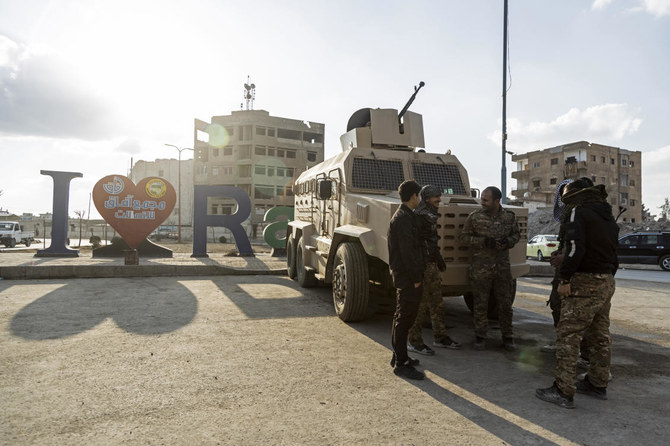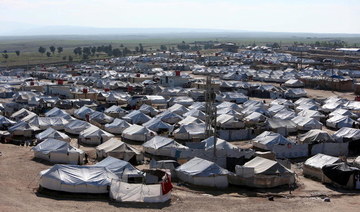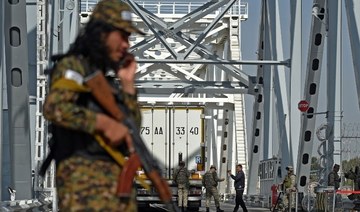RAQQA, Syria: In a square that a few years ago was a grim stage for the Daesh group’s brutal rule in the Syrian city of Raqqa, Mahmoud Dander sat deep in thought.
He wants to leave Syria, but has a problem: The 75-year-old has no money. He recalled the old days before protests and wars led to his country’s collapse and national currency crash: Syria wasn’t thriving back then, but he had work, his children had university degrees and decent futures, and food was always on the table.
That’s all gone now. “We have fallen, just like our currency,” he said.
Raqqa, the former de facto capital of the self-proclaimed Daesh caliphate and home to about 300,000 people, is now free, but many of its residents try to leave. Those with property are trying to sell it to save up for the journey to Turkey. Those without money struggle to get by.
At least 3,000 people left Raqqa for Turkey in 2021, according to the city’s civil council co-chair Mohammed Nour.
Their reasons span the spectrum of post-war life in Syria, one of the world’s most complex conflict zones. They include economic collapse and widespread unemployment following one of the worst years of drought, as well as fears of an Daesh comeback and a proliferation of criminal gangs. And there is the looming specter of conflict between rival powers that control various parts of northern Syria, including Turkey, Russia and Syrian government forces.
On the surface, the city’s slow recovery from Daesh rule is evident. Cafes and restaurant are full of patrons. Kurdish-led forces stand guard at every major intersection.
But poverty is rampant in the majority Arab city administered by US-backed Kurdish-led forces. People line up for basics such as bread. Unemployed young men sit around. Water and electricity are limited. Many live among bombed-out ruins. Local officials say at least 30 percent of the city remains destroyed.
Poverty and unemployment drive young men into the arms of Daesh. Kurdish investigators say new Daesh recruits captured last month had been lured by money. At the same time, the Kurdish-led city administration received applications from 27,000 job seekers last year, but had no jobs.
Milhem Daher, a 35-year-old engineer, is in the process of selling his home, businesses and properties to pay a smuggler to take him and his family of eight to Turkey, a key route for Syrian migrants trying to win asylum in Europe.
He plans to leave as soon as he has enough money.
Daher had survived Raqqa’s recent violent history, including the outbreak of Syria’s civil war in 2011, and the 2014 takeover by Daesh militants who turned the city into the capital of their caliphate spanning parts of Syria and Iraq. A US-led coalition dropped thousands of bombs on the once vibrant city to drive out Daesh, liberating it in 2017. Daesh lost its last territorial foothold in Syria in 2019.
Daher emerged from the dark chapter ready to invest, but said he faced many obstacles, including a lack of resources and export markets. “If you sell to locals, it won’t generate profit,” he said.
For his first project, Daher bought seeds to cultivate vegetables. When it was time to harvest, traders weren’t interested in paying the asking price.
He purchased trucks to lift rubble amid reconstruction efforts. But the quality of the vehicles quickly degraded as a result of poor fuel in the market and lack of materials for upkeep. A potato chip factory and Internet service company also floundered.
Finally, Daher bought livestock, but a devastating drought led to shortages in animal feed. His cattle died.
Now he is selling off what remains of these failed businesses to start a new life. He needs $10,000.
In Raqqa, having money can also be a problem as kidnappings-for-ransom are on the rise.
Real estate developer Imam Al-Hasan, 37, was taken from his home and held for days by attackers in military fatigues. To secure his release, he paid $400,000, money belonging to him and traders who trusted him with their life savings. He complained to the local authorities, but he said nothing was done. A month after the ordeal, bruises are still visible on his face and legs.
Al-Hasan, too, is selling his home and belongings. “There is nothing left for me here,” he said.
Two of Al-Hasan’s relatives who left in September and recently arrived in Europe said that apart from economic uncertainty it was the threat of more violence that pushed them to leave.
“At any moment the situation could explode, how can I stay there?” said Ibrahim, 27. He and Mohammed, 41, spoke under the condition that only their first names be used, citing security concerns for their wives and children still living in the city.
Like many others, their journey from northeastern Syria to Europe began via tunnels along the town of Ras Al-Ain, which straddles the border with Turkey.
The smuggler had charged $2,000 per person. From there, the path to Europe was riddled with risk.
Ibrahim arrived in Germany last week after an arduous journey that began in Belarus. Mohammed walked for treacherous miles before setting off for Greece by boat. He ended up in The Netherlands in October.
Mohammed is waiting for a chance to bring his family from Raqqa to Europe, he said in a phone interview. For now, he is without work.
Back in Raqqa, Reem Al-Ani, 70, prepares tea for two. Her son is the only one of four children who has remained in Syria. The others are spread across the world.
The stairs leading to their apartment are riddled with bullet holes, remnants of battles to dislodge Daesh. The ceilings are charred from smoke.
She has grown accustomed to a silent house. “I miss them,” she said of her children.
Nearby, in Naim Square, the elderly Dander says he barely makes ends meet, surviving on his rapidly diminishing pension from his previous government job.
His three children have university degrees in engineering and literature, and one was a teacher, he said. But none have been able to find work. He wishes he had the money to help them leave.
“I spend every day thinking about how to get out,” he said.
Poverty, fear drive exodus from Syria’s one-time Daesh capital
https://arab.news/9mf6a
Poverty, fear drive exodus from Syria’s one-time Daesh capital

Gaza baby rescued from dead mother’s womb dies

- Doctors were able to save the baby, delivering her by Caesarean section
- The baby suffered respiratory problems and a weak immune system, said Doctor Mohammad Salama who had been caring for Sabreen Al-Rouh
RAFAH, Gaza Strip: A baby girl who was delivered from her dying mother’s womb in a Gaza hospital following an Israeli airstrike has herself died after just a few days of life, the doctor who was caring for her said on Friday.
The baby had been named Sabreen Al-Rouh. The second name means “soul” in Arabic.
Her mother, Sabreen Al-Sakani (al-Sheikh), was seriously injured when the Israeli strike hit the family home in Rafah, the southernmost city in the besieged Gaza Strip, on Saturday night.
Her husband Shukri and their three-year-old daughter Malak were killed.
Sabreen Al-Rouh, who was 30-weeks pregnant, was rushed to the Emirati hospital in Rafah. She died of her wounds, but doctors were able to save the baby, delivering her by Caesarean section.
However, the baby suffered respiratory problems and a weak immune system, said Doctor Mohammad Salama, head of the emergency neo-natal unit at Emirati Hospital, who had been caring for Sabreen Al-Rouh.
She died on Thursday and her tiny body was buried in a sandy graveyard in Rafah.
“I and other doctors tried to save her, but she died. For me personally, it was a very difficult and painful day,” he told Reuters by phone.
“She was born while her respiratory system wasn’t mature, and her immune system was very weak and that is what led to her death. She joined her family as a martyr,” Salama said.
More than 34,000 Palestinians, many of them women and children, have been killed in the six-month-old war in Gaza between Israel and Hamas militants, according to the Gaza health ministry. Israel denies deliberately targeting civilians in its campaign to eradicate Hamas.
Much of Gaza has been laid to waste by Israeli bombardments and most of the enclave’s hospitals have been badly damaged, while those still operating are short of electricity, medicine sterilization equipment and other supplies.
“(Sabreen Al-Rouh’s) grandmother urged me and the doctors to take care of her because she would be someone that would keep the memory of her mother, father and sister alive, but it was God’s will that she died,” Salama said.
Her uncle, Rami Al-Sheikh Jouda, sat by her grave on Friday lamenting the loss of the infant and the others in the family.
He said he had visited the hospital every day to check on Sabreen Al-Rouh’s health. Doctors told him she had a respiratory problem but he did not think it was bad until he got a call from the hospital telling him the baby had died.
“Rouh is gone, my brother, his wife and daughter are gone, his brother-in-law and the house that used to bring us together are gone,” he told Reuters.
“We are left with no memories of my brother, his daughter, or his wife. Everything was gone, even their pictures, their mobile phones, we couldn’t find them,” the uncle said.
UN denounces ‘more serious’ Iran crackdown on women without veils

- Hundreds of businesses including restaurants and cafes have been shut down for not enforcing the hijab rule
- More women began refusing the veil in the wake of the 2022 death in custody of 22-year-old Mahsa Amini
GENEVA: The United Nations said Friday that it was concerned by reports of new efforts to track and punish Iranian women, some as young as 15, who refuse to wear the headscarf required under the country’s Islamic law.
The UN Human Rights Office also expressed alarm about a draft bill on “Supporting the Family by Promoting the Culture of Chastity and Hijab,” which would impose tougher sentences on women appearing in public without the hijab.
“What we have seen, what we’re hearing is, in the past months, that the authorities, whether they be plainclothes police or policemen in uniform, are increasingly enforcing the hijab bill,” Jeremy Laurence, a spokesman for the office, said at a press conference.
“There have been reports of widespread arrests and harassment of women and girls — many between the ages of 15 and 17,” he said.
Iranian police announced in mid-April reinforced checks on hijab use, saying the law was increasingly being flouted.
Hundreds of businesses including restaurants and cafes have been shut down for not enforcing the hijab rule, and surveillance cameras are being used to identify women without it, Laurence said.
More women began refusing the veil in the wake of the 2022 death in custody of 22-year-old Mahsa Amini after her arrest by Iran’s morality police for allegedly breaking the headscarf law, which sparked a wave of deadly protests against the government.
Laurence said that on April 21, “the Tehran head of the Islamic Revolutionary Guard Corps announced the creation of a new body to enforce existing mandatory hijab laws, adding that guard members have been trained to do so ‘in a more serious manner’ in public spaces.”
And while the latest draft of the new hijab bill has not been released, “an earlier version stipulates that those found guilty of violating the mandatory dress code could face up to 10 years’ imprisonment, flogging, and fines,” he said, adding that “this bill must be shelved.”
The Human Rights Office also called for the release of a rapper sentenced to death for supporting nationwide protests sparked by Amini’s death.
Toomaj Salehi, 33, was arrested in October 2022 for publicly backing the uprising.
“All individuals imprisoned for exercising their freedom of opinion and expression, including artistic expression, must be released,” Laurence said.
UN seeks to deescalate Sudan tensions amid reports of possible attack

- UN Secretary-General Antonio Guterres’ envoy is engaging with all parties to deescalate tensions
UNITED NATIONS: The United Nations is increasingly concerned about escalating tensions in Al-Fashir in Sudan’s North Dafur region amid reports that the Rapid Support Forces are encircling the city, signaling a possible imminent attack, the UN’s spokesperson said on Friday.
UN Secretary-General Antonio Guterres’ envoy is engaging with all parties to deescalate tensions in the area, the spokesperson said.
Israeli army says missile fire kills civilian near Lebanon

- The violence has fueled fears of all-out conflict between Iran-backed Hezbollah and Israel
- “Overnight, terrorists fired anti-tank missiles toward the area of Har Dov in northern Israel,” the Israeli army said
JERUSALEM: The Israeli army said Friday a civilian was killed near the country’s northern border with Lebanon, as near-daily exchanges of fire with Hezbollah rage.
Both sides have stepped up attacks this week, with Hezbollah increasing rocket fire and Israel saying it had carried out “offensive action” across southern Lebanon.
The violence has fueled fears of all-out conflict between Iran-backed Hezbollah and Israel, which last went to war in 2006.
“Overnight, terrorists fired anti-tank missiles toward the area of Har Dov in northern Israel,” the Israeli army said, referring to the disputed Shebaa Farms district.
“As a result, an Israeli civilian doing infrastructure work was injured and he was later pronounced dead.”
Israeli media reported that the victim was an Arab-Israeli truck driver. Police told AFP they had not identified the body, but said it was the only one found after a truck was hit.
Hezbollah said it had destroyed two Israeli vehicles in the Kfarshuba hills overnight in a “complex ambush” on a convoy using missiles and artillery.
The Israeli army did not comment directly on the claim.
It said Israeli fighter jets struck Hezbollah targets around Shebaa village in southern Lebanon including a weapons store and a launcher, while soldiers “fired to remove a threat in the area.”
It said fighter jets also “struck Hezbollah operational infrastructure in the area of Kfarshuba and a military compound in the area of Ain El Tineh in southern Lebanon.”
Lebanon’s official National News Agency reported that Shebaa village, Kfarshuba and Helta were targeted by “more than 150 Israeli shells,” leaving homes damaged.
Iran-backed Hezbollah has been trading almost-daily fire with the Israeli army since the day after its Palestinian ally Hamas carried out an unprecedented attack on Israel on October 7.
Since October 8 at least 380 people have been killed in Lebanon, including 252 Hezbollah fighters and dozens of civilians, according to an AFP tally.
Israel says 11 soldiers and nine civilians have been killed on its side of the border.
Tens of thousands of people have been displaced on both sides.
EU commits $73 million more for Gaza aid

- New EU aid would be focused on food deliveries, clean water, sanitation and shelters
- The EU and United States have demanded that Israel allows more aid into Gaza
BRUSSELS: The European Union on Friday said it was giving an extra 68 million euros ($73 million) to provide desperately needed aid to Palestinians in Gaza.
The territory has been devastated by more than six months of Israeli bombardment and ground operations after Hamas’s October 7 attack, leaving the civilian population of two million people in need of humanitarian assistance to survive.
“In light of the continued deterioration of the severe humanitarian crisis in Gaza, and the steady rise of needs on the ground, the (European) Commission is stepping up its funding to support Palestinians affected by the ongoing war,” an EU statement said.
“This support brings total EU humanitarian assistance to 193 million euros for Palestinians in need inside Gaza and across the region in 2024.”
The EU said the new aid would be focused on food deliveries, clean water, sanitation and shelters, and would be channelled through local partners on the ground.
The United Nations has said Israel’s operation has turned Gaza into a “humanitarian hellscape,” amid fears of a looming famine.
The EU and United States have demanded that Israel allows more aid into Gaza.
The US military said on Thursday it had begun construction of a pier meant to boost deliveries to the territory.
The war in Gaza began with an unprecedented Hamas attack on Israel on October 7 that resulted in the deaths of about 1,170 people in Israel, according to an AFP tally of Israeli official figures.
Israel vowed to destroy Hamas, with a retaliatory offensive that has killed at least 34,356 people in Gaza, mostly women and children, according to the Hamas-run territory’s health ministry.






















